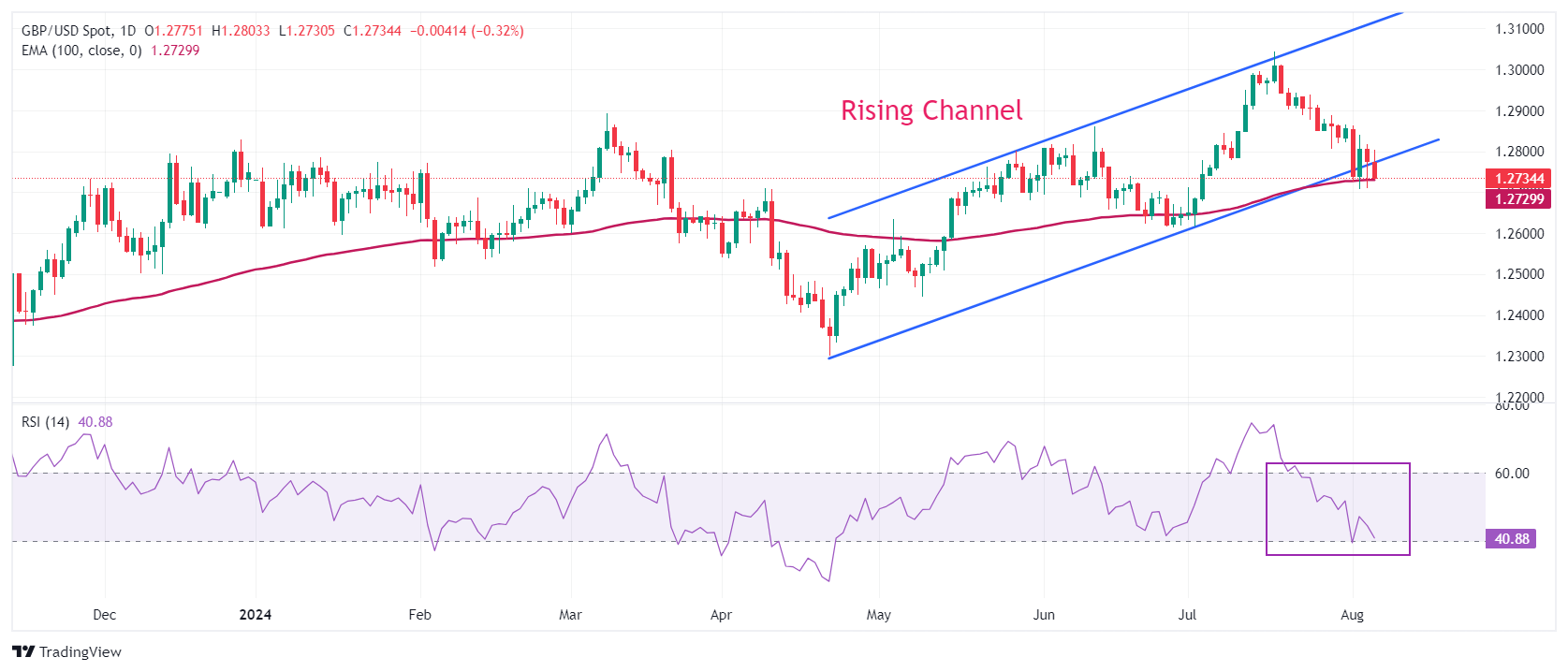- The British Pound fell against the US Dollar to around 1.2750 amid weak appeal for risk-sensitive currencies.
- Investors fear the US economy could enter a recession.
- The British currency will be guided by market speculation about BoE rate cuts.
The British Pound (GBP) falls to near 1.2750 against the US Dollar (USD) in Tuesday’s London session. The GBP/USD pair weakens while the US Dollar holds steady after rebounding from a fresh six-month low. The Dollar Index (DXY), which tracks the value of the Dollar against six major currencies, recovers to near 103.00.
The outlook for the US dollar remains vulnerable as market participants fear growing speculation about a US recession and an announcement of emergency rate cuts by the Federal Reserve (Fed).
Market expectations of a possible US recession grew following a series of weak economic data. The unemployment rate rose to 4.3%, the highest since November 2021, labor demand slowed, and the manufacturing Purchasing Managers’ Index (PMI) contracted at a faster pace in July. However, an economy is considered to be in technical recession if its Gross Domestic Product (GDP) contracts consecutively for two quarters, which appears to be the opposite in the case of the US, knowing that the economy expanded at an annualized pace of 2.8% in the second quarter. The pace at which the US economy grew was double the growth rate recorded in the January-March period.
Additionally, the US services PMI, a sector that accounts for two-thirds of the economy, expanded at a faster pace in July after contracting in June. The PMI report showed that activities in the services sector expanded at a faster-than-expected pace of 51.4. Investors had anticipated a growth in the services PMI to 51.0 from the previous release of 48.8.
Daily Market Wrap: Sterling rises against Yen and Swiss Franc
- The British Pound remains on the defensive against its major peers, but performs strongly against the Japanese Yen (JPY) and Swiss Franc (CHF) as both faced profit-taking on Tuesday. The British currency continues to face pressure from widespread risk aversion.
- Aside from fears of a US slowdown, a possible all-out war between Israel and Iran has also kept risk sentiment on edge. Fears of an escalation of conflicts in the Middle East were sparked after Iran-backed Hezbollah said it launched dozens of missiles at Israel on Saturday in retaliation for the killing of Hamas leader Ismail Haniyeh in an Israeli airstrike in Tehran.
- Domestically, the British Pound will be guided by market speculation on the Bank of England (BoE) in the absence of any major events. Market participants expect that the BoE may also make subsequent rate cuts to combat the fallout from the US slowdown.
- Last week, the BoE cut interest rates by 25 basis points (bps) to 5%, with a vote split of 5-4, as expected. The BoE suggested that the central bank will use a cautious approach in its policy normalisation process.
Technical Analysis: British Pound Holds Near 1.2750
The British Pound is at a crucial point near the lower boundary of an Ascending Channel chart formation on a daily time frame. Historically, a retracement move in the mentioned chart pattern is considered a buying opportunity by market participants.
The GBP/USD pair fell on the defensive after breaking below the crucial support of 1.2900. The Cable is a step away from the 50-day exponential moving average (EMA) near 1.2790, suggesting uncertainty in the near-term trend.
The 14-day Relative Strength Index (RSI) falls to near 40.00, which is expected to act as a cushion for the momentum oscillator.
On the downside, the round level of 1.2800 will be a crucial support zone for the British Pound bulls. Meanwhile, the two-year high near 1.3140 will be a key resistance zone for Cable.
The British Pound FAQs
The Pound Sterling (GBP) is the oldest currency in the world (886 AD) and the official currency of the United Kingdom. It is the fourth most traded currency unit in the world, accounting for 12% of all transactions and an average of $630 billion a day, as of 2022.
Its key currency pairs are GBP/USD, also known as the “Cable,” which accounts for 11% of the forex market, GBP/JPY, or the “Dragon” as it is known to traders (3%), and EUR/GBP (2%). The British Pound is issued by the Bank of England (BoE).
The most important factor influencing the value of the British Pound is the monetary policy decided by the Bank of England. The Bank of England bases its decisions on achieving its main objective of “price stability”, i.e. a stable inflation rate of around 2%. Its main tool for achieving this is the adjustment of interest rates.
When inflation is too high, the Bank of England tries to contain it by raising interest rates, making credit more expensive for individuals and businesses. This is generally positive for the GBP, as higher interest rates make the UK a more attractive place for global investors to park their money.
When inflation is too low, it is a sign that economic growth is slowing. In this scenario, the BoE will consider lowering interest rates to make credit cheaper, so that companies borrow more to invest in growth-generating projects.
The data released gauges the health of the economy and can influence the value of the Pound. Indicators such as GDP, manufacturing and services PMIs, and employment can influence the direction of the Pound.
A strong economy is good for the British Pound. Not only does it attract more foreign investment, but it may encourage the Bank of England to raise interest rates, which will directly strengthen the British Pound. Conversely, if economic data is weak, the British Pound is likely to fall.
Another significant indicator for the pound is the trade balance. This indicator measures the difference between what a country earns from its exports and what it spends on imports during a given period.
If a country produces highly sought-after exports, its currency will benefit exclusively from the additional demand created by foreign buyers who wish to purchase these goods. Therefore, a positive net trade balance strengthens a currency and vice versa for a negative balance.
Source: Fx Street
I am Joshua Winder, a senior-level journalist and editor at World Stock Market. I specialize in covering news related to the stock market and economic trends. With more than 8 years of experience in this field, I have become an expert in financial reporting.








